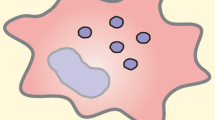Abstract
A specific macrophage migration inhibition assay, using patient lymphocytes incubated with a human colonic cancer extract, was studied in 92 patients with proven colorectal cancer and in 134 other individuals (20 normal controls, 80 patients with various nonmalignant gastrointestinal diseases, and 34 patients with extracolonic malignancies).
A positive response was obtained in 78 of 92 colorectal cancer patients, but in none of the 20 normal controls. A positive response occurred in four of 34 patients with extracolonic malignancies and in approximately half of patients with colonic adenomas and in one third of patients with ulcerative colitis. The significance of positive results in these patients (with diseases considered premalignant) is unclear, and is being studied further. In patients with previous resection of colorectal cancers, positive responses were frequent during the first year following resection, and rare thereafter.
The results suggest that this method may be useful as a clinical marker for colorectal cancer, and warrants further technical refinement and study of specific patient populations.
Similar content being viewed by others
References
American Cancer Society. Cancer facts and figures. New York: American Cancer Society, 1982.
Winawer SJ, Sherlock P. Surveillance before and after diagnosis and treatment of colorectal neoplasia. In: Alexander-Williams J, Binder HJ, eds. Large intestine. Boston: Butterworths, 1983:239–64.
Winawer SJ, Poleski MG, Sherlock P. Susceptibility for colorectal cancer: current concepts of screening, diagnosis and risk. In: Berk JE, ed. Developments in digestive diseases: clinical relevance. Philadelphia: Lea & Febiger, 1979:73–87.
Fath RB Jr, Winawer SJ: Early diagnosis of colorectal cancer. Ann Rev Med 1983;34:501–17.
Gilbertsen VA, McHugh R, Schuman L, Williams SE. The earlier detection of colorectal cancers: a preliminary report of the results of the occult blood study. Cancer 1980;45:2899–2901.
Gilbertsen VA. Proctosigmoidoscopy and polypectomy in reducing the incidence of rectal cancer. Cancer 1974;34:936–9.
Zamcheck N. Current status of CEA. In: Winawer SJ, Schottenfeld D, Sherlock P, eds. Progress in cancer research and therapy. New York: Raven Press, 1980;13:219–34
Holt PG, Fimmel PJ, Finlay-Jones LM, Flower RL. Evaluation of the microplate leukocyte adherence inhibition test and its reproducibility, sensitivity, and relationship to other tests of cellular immunity. Cancer Res 1979;39:564–9.
Helms RA, Bull DM. Natural killer activity of human lymphocytes against colon cancer cells. Gastroenterology 1980;78:738–44.
Maluish AE, Halliday WJ. Hemocytometer leukocyte adherence inhibition technique. Cancer Res 1979;39:625–6.
Ayeni AO, Thomson DM, MacFarlane JK, Daly D. A comparison of tube leukocyte adherence inhibition assay and standard physical methods for diagnosing colorectal cancer. Cancer 1981;48: 1855–62.
Hellström KE, Hellström I. The need to establish whether the leukocyte adherence inhibition test is a reliable assay of tumor immunity in humans. Cancer Res 1979;39:649–50.
Morales A, Ottenhof PC. Clinical application of a whole blood assay for human natural killer (NK) cell activity. Cancer 1983;52:667–70.
Leung KH, Koren HS. Regulation of human natural killing. J Immunol 1982;129:1742–7.
Bull DM, Helm RA, Kushner LM. Natural killer (NK) activity against colon cancer cells: clinical correlations among normal individuals and patients with cancer and other diseases (abst.) Clin Res 1978;26:534A.
Adelman NE, Hammond ME, Cohen S, Dvorak HF. Lymphokines as inflammatory mediators. In: Cohen S, Pick E, Oppenheim JJ, eds. Biology of the lymphokines. New York: Academic Press, 1979:13–58.
Pick E, Cohen S, Oppenheim JJ. The lymphokine concept. In: Cohen S, Pick E, Oppenheim JJ, eds. Biology of the lymphokines. New York: Academic Press, 1979:1–12.
Zoller M, Schulz U, Dietze W, Wesch H, Matzku S. Postsurgical follow-up of colorectal cancer patients monitored by the leukocyte migration test. J Natl Cancer Inst 1983;70:581–7.
Pick E. Mechanism of action of migration inhibitory lymphokines. In: Cohen S, Pick E, Oppenheim JJ, eds. Biology of lymphokines. New York: Academic Press, 1979:59–119.
Livni E, Gilon G, Shkolnik T, Cervaodio C. The significance of the macrophage migration inhibition factor test in patients with renal space occupying lesions (abstr). Tumour Biol 1984;5:101.
Yoshida T, Janeway CA Jr, Paul WE. Activity of migration inhibitory factor in the absence of antigen. J Immunol 1972;109:201–6.
Szigeti R, Dalianis T, Ramqvist T, Ito Y, Klein G. Detection of mutant-specific responses by macrophage migration inhibition reactions induced by wild-type and mutant polyoma viruses and polyoma virus-infected cells. Cancer Res 1984;44:1077–80.
Donskoy M, Forouhar F, Cohen MC. Lymphokine-induced migration inhibition of murine tumor cells derived from solid neoplasms. Cancer Res 1984;44:3870–2.
Suslov I, McCoy JL, Herberman RB. Indirect leukocyte migration inhibition reactions to a 3-M KCl extract of lung adenocarcinoma by lung cancer patients. J Natl Cancer Inst 1981;66:233–7.
Tripodi DS, Lyons S, Davies D. Separation of peripheral leukocytes by Ficoll density gradient centrifugation. Transplantation 1971;11:487–8.
Lowry OH, Rosebrough NJ, Farr AL, Randall RJ. Protein measurement with the Folin phenol reagent. J Biol Chem 1951;193:265–75.
Turnbull RB Jr, Kyle K, Watson FR, Spratt J. Cancer of the colon: the colon: the influence of theno-touch isolation technic on survival rates. Ann Surg 1967;166:420–7.
Ablin RJ, Guinan PD, Bhatti RA. Cell-mediated immunity in prostatic cancer and its diagnostic relevancy. Eur J Cancer Clin Oncol 1983;19:467–71.
Thomson DM, Tataryn DN, Lopez M, Schwartz R, MacFarlane JK. Human tumor-specific immunity assayed by a computerized tube leukocyte adherence inhibition. Cancer Res 1979;39:638–43.
Yoshida T, Bigazzi P, Cohen S. Biologic and antigenic similarity of virus-induced migration inhibition factor to conventional, lymphocyte-derived migration inhibition factor. Proc Natl Acad Sci USA 1975;72:1641–4.
Arends JW, Bosman FT, Hilgers J. Tissue antigens in large bowel carcinoma. Biochim Biophys Acta 1984;780:1–19.
Author information
Authors and Affiliations
Additional information
The abstract of this research has been accepted for presentation at the Sixth International Congress of Immunology, Toronto, Canada, July 6 to 11, 1986.
Supported by a grant from the Chief Scientist, Israel Ministry of Health.
About this article
Cite this article
Shkolnik, T., Livni, E., Reshef, R. et al. The macrophage migration inhibition (MIF) assay as a marker of colorectal cancer. Dis Colon Rectum 30, 101–105 (1987). https://doi.org/10.1007/BF02554942
Received:
Issue Date:
DOI: https://doi.org/10.1007/BF02554942




